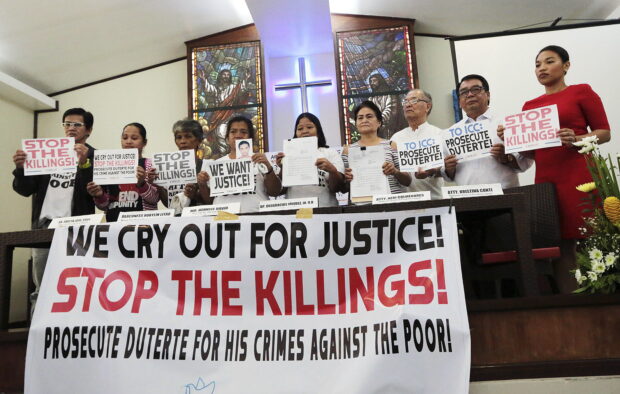
CRY FOR JUSTICE | In this 2018 photo, leaders and supporters of Rise Up for Life and for Rights, a network of Church workers, human rights advocates, and relatives of victims of drug-related killings, air their appeal for justice for victims of then-President Rodrigo Duterte’s bloody war on drugs. (Photo by GRIG C. MONTEGRANDE / Philippine Daily Inquirer)
MANILA, Philippines — Justice Secretary Jesus Crispin Remulla on Monday said the Philippine government will not bow to the International Criminal Court (ICC) if it issues warrants of arrest against certain individuals once the tribunal favors the resumption of its investigation of crimes against humanity committed during the drug war of former President Rodrigo Duterte.
“No, they won’t do anything here,” Remulla said. “They have nothing to do here. What will they do, invade us? Do they want to come here like we’re a colony? That’s a thing of the past… We are now a free country and we have our own system of laws.”
The Appeals Chamber of the ICC is expected to announce today its decision on the Philippine government’s appeal against the continuation of the ICC prosecutor’s probe into the killings during the drug war.
But Remulla told reporters: “They are not welcome here in the Philippines. We are a very hospitable people, but if what they will do is just meddling, we will not allow that. We have our own system of laws, we have our own tradition, we have our own police force, we have our own prosecution, and we have courts that they should not interfere with or ignore.”
“They should respect our sovereignty. My appeal is for them not to attempt to interfere with us,” he added.
According to the justice chief, the ICC has allowed itself to be used in political agendas which seek to meddle with the country’s sovereignty and judicial processes.
“The ICC is for countries with no prevailing justice system and it is where they are needed. They should not interfere in the established system of the Republic of the Philippines,” Remulla said.
Pass on evidence
He suggested that the ICC instead pass on its evidence to the Philippine government if they want certain individuals to be held accountable.
“As long as they have evidence against these persons that they want prosecuted, then they should give them to us so that we will be the ones to prosecute those who committed crimes in our country,” he said.
Remulla’s predecessor, Solicitor General Menardo Guevarra, said: “Going by the series of ICC actions, we are not too sanguine about a favorable ruling… [W]e just want to exhaust all legal remedies available to us under the framework of the Rome Statute.”
He said that if the government’s appeal is upheld by the ICC’s Appeals Chamber, then that will be the end of the investigation.
Who will enforce?
“[But] if the appeal is dismissed, then the ICC prosecutor will be authorized to resume his investigation into the Philippine situation. There will be no further appeal available to the Philippine government,” Guevarra said.
He explained further that, “depending on the evidence he may be able to gather, the ICC prosecutor may seek the issuance of summonses or warrants of arrest against certain individuals. These persons who may be indicted will have to engage their own defense counsel.”
Guevarra noted in an earlier interview that the question remains as to who will enforce the ICC’s arrest warrants.
“Whether the ICC can enforce it or not is a totally different question because the ICC will have to depend on local authorities to enforce that warrant of arrest,” he said.
But regardless of the outcome today, Guevarra said the Philippine government would continue its own investigation and prosecution of abuses in connection with the drug war.
Police in drug trade
Meanwhile, Sen. Risa Hontiveros pointed out that Malacañang’s “silence” on the alleged involvement of the police in the drug trade compels the ICC’s continuing investigation.
“If this administration wants to exact accountability, if it wants to really solve our issue of problematic drug use, if they really want to fix government institutions including the (Philippine National Police), why aren’t they speaking up?” Hontiveros said at a forum on Monday.
It will be recalled that President Marcos in January had sought the courtesy resignations of PNP officials, amid reports of violations committed by the police in the drug war and of police involvement in the drug trade.
The alleged role of the police in illegal drugs was especially underscored by the raid on Oct. 8, 2022, at a Manila warehouse operated by a narcotics officer and the apparent cover-up that followed that operation.
Hontiveros said Mr. Marcos “must be mindful that this war on drugs, which soon turned out to be a war on the poor, has led to the death of about 30,000 poor victims, which is one of the most severe, darkest legacies of the Duterte administration.”
She expressed optimism that the ICC will allow the resumption of the investigation of the government’s war on drugs.